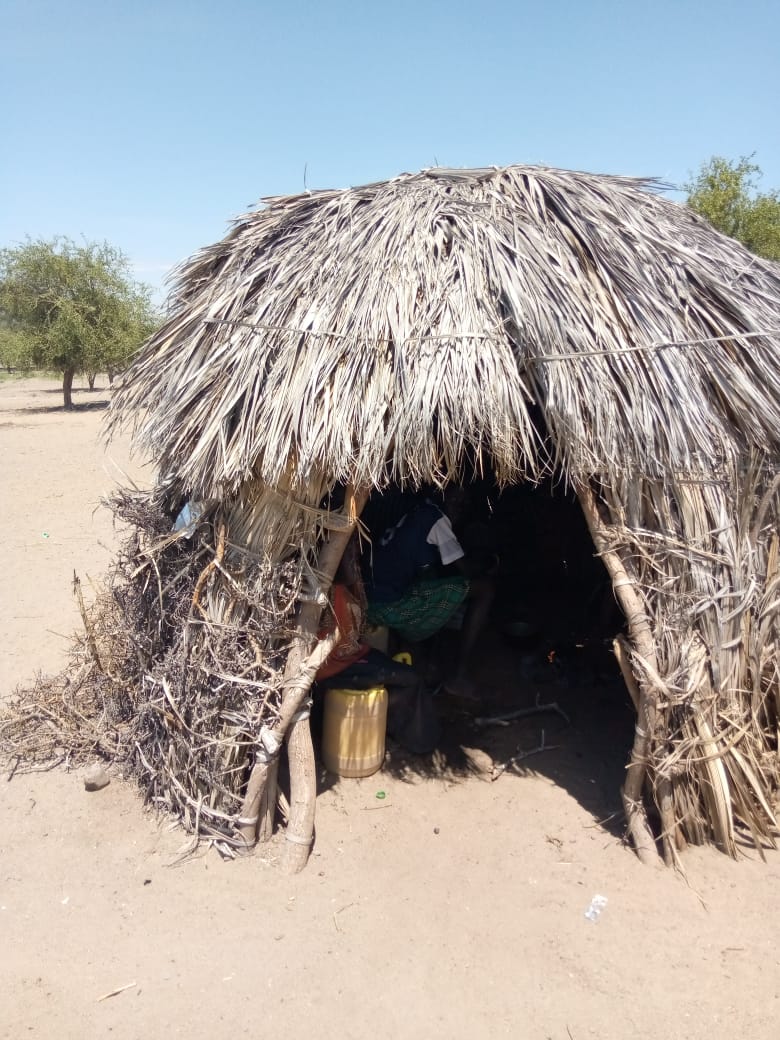 Sometimes the moon is low over Turkana and the night an impregnable shade of black. Other nights the same sky is littered by a million blinking stars. Those nights Ibei sits outside this little hut, one of the only two huts in the boma.
Asleep inside are her six siblings, all younger than her. She thinks of the conversation she had with her best friend a few days ago. Her friend told her that she thinks she knows the boy she had been betrothed to. He was a cocky boy with ashen knees and liked to brawl and jostle with other boys in the fields. A bit of an exhibitionist, that one. He lived across the lake, in a family with many heads of cattle. Her friend had recently been “booked” for marriage as is the case in Turkana, a process that involves your mother placing a copper bracelet on your wrist. Akinyonyo, they call it.
“What do you think of him?” Ibei had asked her friend who is also 12 years old.
She shrugged. “He’s too loud.”
“You don’t like someone loud?”
“No,” she said. “I like someone quiet.”
Ibei, seated outside the hut in the middle of the warm night had wondered if she would also soon get a copper bracelet on her finger, to marry someone she didn’t know. Maybe someone loud and obnoxious or someone who just liked to talk about themselves throughout. Those she can’t stand. Or those boys who had their eyes set too close to each other, like an eagle.
When you are “booked” by a parent of the boy (normally at 12 or 13 years), your mother sits you down and tells you that now you have to behave yourself because you are soon starting your own home. You can’t just be seen frolicking with other boys. Your brothers tend to keep an eye on you, to report back your activities. You can’t bring shame to the family. Of course, it would be nice if she chose for herself, she thinks. If her father looked the other away and let her fall in love with a boy of her choosing.
As the night wore on, a cool breeze started blowing and she sat there listening to it, and to her thoughts and to the occasional jostling of the goats in the pen. She secretly hoped that schools would open again. After an hour of personal time, she will then go back into the hut and curl on the skins that is her mattress and she will sleep soundly.
Sometimes the moon is low over Turkana and the night an impregnable shade of black. Other nights the same sky is littered by a million blinking stars. Those nights Ibei sits outside this little hut, one of the only two huts in the boma.
Asleep inside are her six siblings, all younger than her. She thinks of the conversation she had with her best friend a few days ago. Her friend told her that she thinks she knows the boy she had been betrothed to. He was a cocky boy with ashen knees and liked to brawl and jostle with other boys in the fields. A bit of an exhibitionist, that one. He lived across the lake, in a family with many heads of cattle. Her friend had recently been “booked” for marriage as is the case in Turkana, a process that involves your mother placing a copper bracelet on your wrist. Akinyonyo, they call it.
“What do you think of him?” Ibei had asked her friend who is also 12 years old.
She shrugged. “He’s too loud.”
“You don’t like someone loud?”
“No,” she said. “I like someone quiet.”
Ibei, seated outside the hut in the middle of the warm night had wondered if she would also soon get a copper bracelet on her finger, to marry someone she didn’t know. Maybe someone loud and obnoxious or someone who just liked to talk about themselves throughout. Those she can’t stand. Or those boys who had their eyes set too close to each other, like an eagle.
When you are “booked” by a parent of the boy (normally at 12 or 13 years), your mother sits you down and tells you that now you have to behave yourself because you are soon starting your own home. You can’t just be seen frolicking with other boys. Your brothers tend to keep an eye on you, to report back your activities. You can’t bring shame to the family. Of course, it would be nice if she chose for herself, she thinks. If her father looked the other away and let her fall in love with a boy of her choosing.
As the night wore on, a cool breeze started blowing and she sat there listening to it, and to her thoughts and to the occasional jostling of the goats in the pen. She secretly hoped that schools would open again. After an hour of personal time, she will then go back into the hut and curl on the skins that is her mattress and she will sleep soundly.
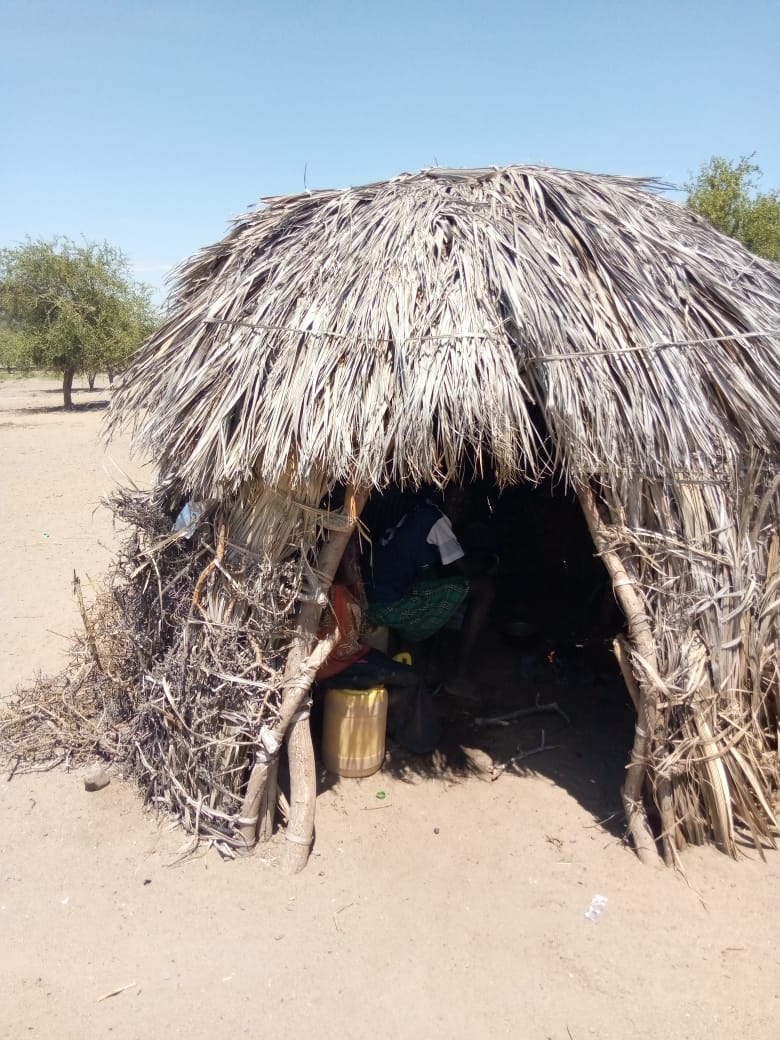 At 5:30am Ibei emerges from their hut. Outside, still dark and cold. She yawns then shuffles to the edge of the boma where she takes a leak. As she gets up, she sees her mother’s shadow leaving her hut. “Ibei, aluwae eye a elepit na angakile…” She’s asking about the gourd for milking the goats. Ibei will fetch the gourd and together, they will milk 10 goats together in complete silence as the goats sneeze from the early morning cold.
As they emerge from their morning task, she will see her father seated outside their house on an Ecicolong, the ceremonial wooden stool. Only men sit on this stool – men and boys who have undergone an initiation ceremony. His father is in his early 30s.
“Ejok, apa?” She will call out in greeting.
“Ejok, noi,” he will growl. He’s a quiet man, always soaking in his thoughts. He never raises his voice. Or his hands. His authority is silence and she has learnt to see his love through it.
It’s 6:30am now and the sun is already rising eagerly on the horizon beyond the carcasses of the shrubs and the thorn trees. There is no school, of course, because of Covid-19, which Ibei sees as a rare disease that only affects people in a faraway land, in cities that are simply at the very edge of her imagination. She retrieves her toothbrush from where she had wedged it above the entrance of the doorway of their hat. It’s a makeshift twig, this toothbrush, from a tree called Esekon. It cleans the teeth well and is not bitter. Her father, from where he is seated, also has a twig in his mouth, staring blankly ahead at the gate of their boma as if expecting something. Or someone.
At 5:30am Ibei emerges from their hut. Outside, still dark and cold. She yawns then shuffles to the edge of the boma where she takes a leak. As she gets up, she sees her mother’s shadow leaving her hut. “Ibei, aluwae eye a elepit na angakile…” She’s asking about the gourd for milking the goats. Ibei will fetch the gourd and together, they will milk 10 goats together in complete silence as the goats sneeze from the early morning cold.
As they emerge from their morning task, she will see her father seated outside their house on an Ecicolong, the ceremonial wooden stool. Only men sit on this stool – men and boys who have undergone an initiation ceremony. His father is in his early 30s.
“Ejok, apa?” She will call out in greeting.
“Ejok, noi,” he will growl. He’s a quiet man, always soaking in his thoughts. He never raises his voice. Or his hands. His authority is silence and she has learnt to see his love through it.
It’s 6:30am now and the sun is already rising eagerly on the horizon beyond the carcasses of the shrubs and the thorn trees. There is no school, of course, because of Covid-19, which Ibei sees as a rare disease that only affects people in a faraway land, in cities that are simply at the very edge of her imagination. She retrieves her toothbrush from where she had wedged it above the entrance of the doorway of their hat. It’s a makeshift twig, this toothbrush, from a tree called Esekon. It cleans the teeth well and is not bitter. Her father, from where he is seated, also has a twig in his mouth, staring blankly ahead at the gate of their boma as if expecting something. Or someone.
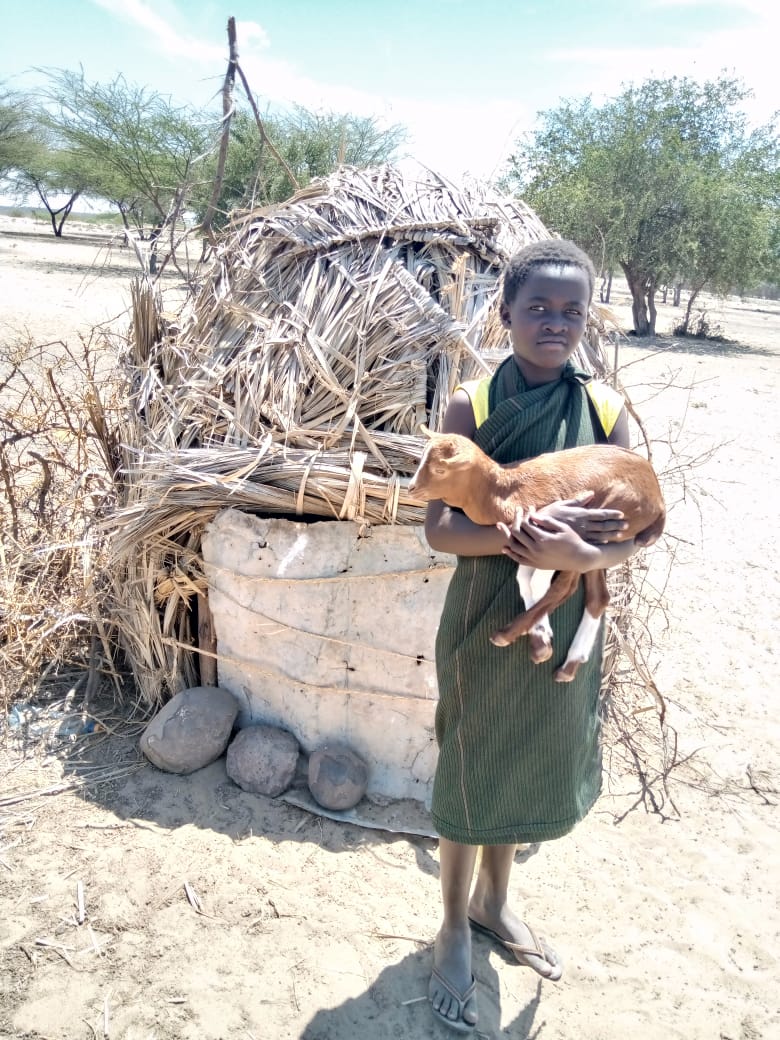 This is Ibei and her favourite kid. The kid is called Eta-eparas, because she has stripes like a horse. She has never seen a horse in real life, of course, but in a story book. They looked elegant, how their big heads tapered down. She loves Eta-eparas. She reminds her of herself because she’s an introvert like the Eta-eparas. She doesn’t mind staying out alone in the field tending goats with no one to talk to. She loves the quiet of the plains, only punctuated by the clanging of the bells under one goat’s neck. She can sit there a whole day, ignoring hunger, heat or dust.
I asked her what dominates her thoughts out there in the plain. What is it that she thinks of? I ask her over the phone, of course.
So how these conversations have been happening is that I call a gentleman called Abach who has to walk for a kilometre or so in the sun and parched land to her village where he calls me and asks me to call back. Being an introvert she finds talking laborious, even worse talking to a strange voice on the phone. So our conversations that happened over three days, are marked by a lot of long pauses during which I either hear the wind blowing, the bleating of a goat or just the stillness of the Turkana heat.
“I don’t think of anything,” she replied.
“So you just sit under a tree and not think?”
Long pause.
“Yes. I look at the goats.”
Often, Eta-eparas comes and lies next to her in the shade. Sometimes she rubs her neck, other times they just sit there in their comfortable silence because her kid isn’t perturbed by being silent.
This is Ibei and her favourite kid. The kid is called Eta-eparas, because she has stripes like a horse. She has never seen a horse in real life, of course, but in a story book. They looked elegant, how their big heads tapered down. She loves Eta-eparas. She reminds her of herself because she’s an introvert like the Eta-eparas. She doesn’t mind staying out alone in the field tending goats with no one to talk to. She loves the quiet of the plains, only punctuated by the clanging of the bells under one goat’s neck. She can sit there a whole day, ignoring hunger, heat or dust.
I asked her what dominates her thoughts out there in the plain. What is it that she thinks of? I ask her over the phone, of course.
So how these conversations have been happening is that I call a gentleman called Abach who has to walk for a kilometre or so in the sun and parched land to her village where he calls me and asks me to call back. Being an introvert she finds talking laborious, even worse talking to a strange voice on the phone. So our conversations that happened over three days, are marked by a lot of long pauses during which I either hear the wind blowing, the bleating of a goat or just the stillness of the Turkana heat.
“I don’t think of anything,” she replied.
“So you just sit under a tree and not think?”
Long pause.
“Yes. I look at the goats.”
Often, Eta-eparas comes and lies next to her in the shade. Sometimes she rubs her neck, other times they just sit there in their comfortable silence because her kid isn’t perturbed by being silent.
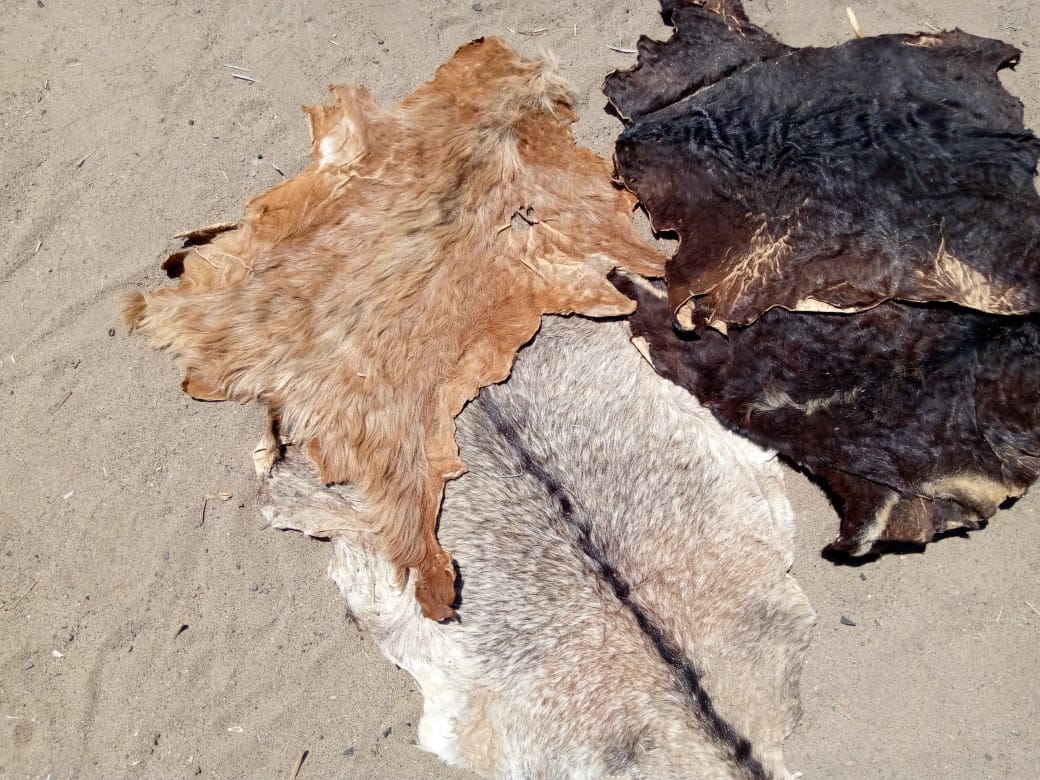 She will remove her beddings and air them in the sun. Those are her beddings; hides and skin. Then she will have breakfast – milk from the goats. They call it Ngakile. That’s the daily breakfast for everybody. The father’s job is to give roles; who fetches firewood, washes utensils, or fetches water from Lake Turkana that is three kilometres away. Because she’s the eldest and there is no school now, she will do most of the chores. Her father will place his gourd down and say, “Kido’ngo niajokon alosi akitwar ngakinei,” [See you later, I’ve taken the goats to graze] and then walk out with his goats, holding a long staff in his hands like a character from the Old testament. He will be gone the whole day.
She will remove her beddings and air them in the sun. Those are her beddings; hides and skin. Then she will have breakfast – milk from the goats. They call it Ngakile. That’s the daily breakfast for everybody. The father’s job is to give roles; who fetches firewood, washes utensils, or fetches water from Lake Turkana that is three kilometres away. Because she’s the eldest and there is no school now, she will do most of the chores. Her father will place his gourd down and say, “Kido’ngo niajokon alosi akitwar ngakinei,” [See you later, I’ve taken the goats to graze] and then walk out with his goats, holding a long staff in his hands like a character from the Old testament. He will be gone the whole day.
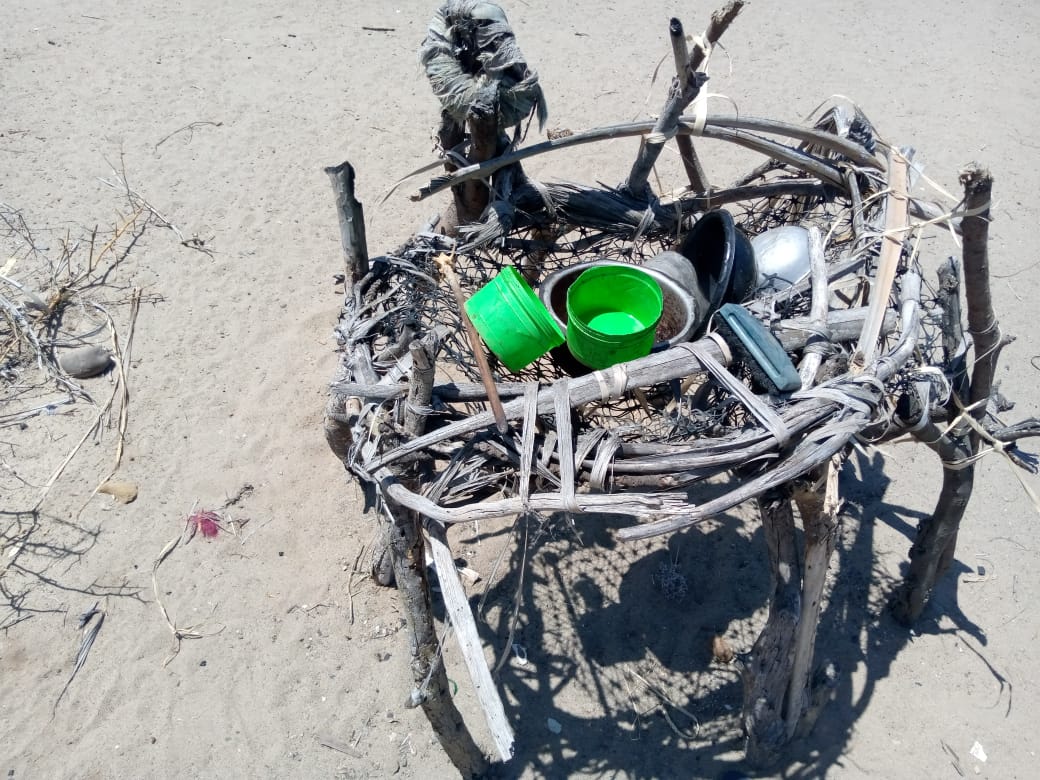 She will do the dishes. Maybe while humming a song. Maybe while deep in thought. Her siblings will be skirting around in the dust barefoot, playing, giggling, chasing each other. Then she will put the utensils on the rack to dry. Her mother built that rack. She will then go fetch firewood in the laga, a dried riverbed. Maybe she will run into one of her friends. Or neighbourhood boys.
“Do you know when school is opening?” She will ask.
“No. I hope not soon,” one of the boys will remark cheekily.
She was born in her grandmother’s hut in a village called Nachukui. That day it drizzled, her grandmother told her. A sign that she had come with immense blessings. She has always wondered what that meant. Because at 12 nothing made her feel that she stood out from all the girls in the village. Where were the blessings coming from? She had been waiting for those blessings. She’s afraid to dream too big. To want things that are bigger than her, bigger than her village, or her town.
I asked her what she wanted to be when she grew up and there was a long uncomfortable silence on the phone. “Hello?” I said. “Are you there, Ibei?”
“Yes,” she mumbled in a voice filled with dust.
“Do you know what you want to be when you are a big girl?” I asked again. More silence.
I could hear Abach whispering in the background. So I asked Abach to hand the mother the phone. I asked her what Ibei wants when she grows up. “Has she told you?”
She said a doctor. When I got Ibei back on the phone I asked her why she didn’t tell me that herself. More silence.
There is no lunch. There is never any food for lunch, maybe for the very small siblings. At lunchtime they are out and about, fetching water, or firewood or napping under a shade. At this time the sun is brutal; going way over 35 degrees. Now that school is out, she – with some of her other siblings – often walk to visit their grandmother, after taking a bath in Lake Turkana. Her grandmother likes telling stories. She also likes her because she puts dreams in her head; that she is ‘blessed’. That she can be a ‘person’ but only if she goes to school. Every dream that she dares to dream has come from her grandmother who always talks about ‘ngakitadea.” To mean “Books.” She, an illiterate old woman, somehow finds the power in education, she sees her dream in them even though she can’t read or write.
She will do the dishes. Maybe while humming a song. Maybe while deep in thought. Her siblings will be skirting around in the dust barefoot, playing, giggling, chasing each other. Then she will put the utensils on the rack to dry. Her mother built that rack. She will then go fetch firewood in the laga, a dried riverbed. Maybe she will run into one of her friends. Or neighbourhood boys.
“Do you know when school is opening?” She will ask.
“No. I hope not soon,” one of the boys will remark cheekily.
She was born in her grandmother’s hut in a village called Nachukui. That day it drizzled, her grandmother told her. A sign that she had come with immense blessings. She has always wondered what that meant. Because at 12 nothing made her feel that she stood out from all the girls in the village. Where were the blessings coming from? She had been waiting for those blessings. She’s afraid to dream too big. To want things that are bigger than her, bigger than her village, or her town.
I asked her what she wanted to be when she grew up and there was a long uncomfortable silence on the phone. “Hello?” I said. “Are you there, Ibei?”
“Yes,” she mumbled in a voice filled with dust.
“Do you know what you want to be when you are a big girl?” I asked again. More silence.
I could hear Abach whispering in the background. So I asked Abach to hand the mother the phone. I asked her what Ibei wants when she grows up. “Has she told you?”
She said a doctor. When I got Ibei back on the phone I asked her why she didn’t tell me that herself. More silence.
There is no lunch. There is never any food for lunch, maybe for the very small siblings. At lunchtime they are out and about, fetching water, or firewood or napping under a shade. At this time the sun is brutal; going way over 35 degrees. Now that school is out, she – with some of her other siblings – often walk to visit their grandmother, after taking a bath in Lake Turkana. Her grandmother likes telling stories. She also likes her because she puts dreams in her head; that she is ‘blessed’. That she can be a ‘person’ but only if she goes to school. Every dream that she dares to dream has come from her grandmother who always talks about ‘ngakitadea.” To mean “Books.” She, an illiterate old woman, somehow finds the power in education, she sees her dream in them even though she can’t read or write.
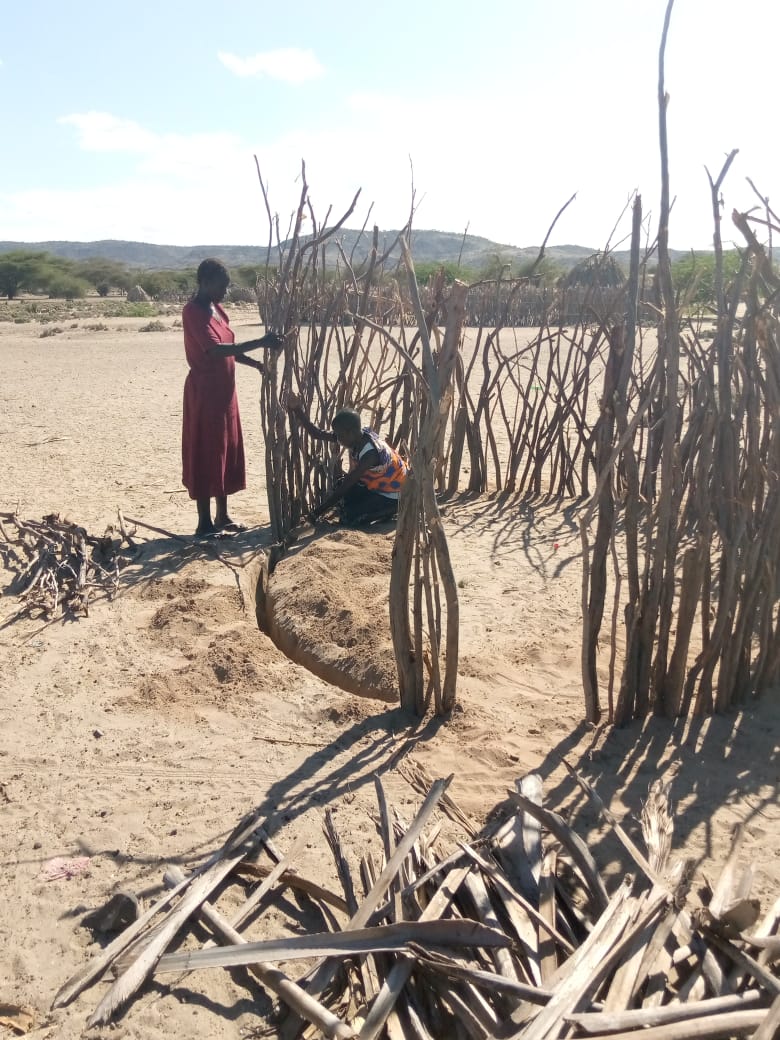 As the sun bows its head in the distant hills of Emoru, marking the end of the day. Her father drives the goats in the kraal and locks them there. He’s tired and hungry and he drags his dusty feet. He already took a bath in the lake. He emerges from the house with his Ecicolong and sits outside the hut. The children gather around him excitedly and he plays with them for a bit.
Her mother is making a fire, already boiling a dinner of maize and beans. Ibei helps her mother, stoking the fire, stirring. Soon it’s dark and the children have gathered around a fire that the father has made. The children chatter and giggle as they wait for supper. The first person to be served is the father, who also gets the lion’s share. The next person to be served is anyone who takes the goats out the next day. The mother serves herself last. They eat together, every day, around that fire, chatting and laughing. Except for her father who occasionally comments or chuckles at something. Mostly he just sits there on his stool, looking over them protectively.
They don’t own a lantern or candles, if you need light you take a burning twig and use it. Otherwise, everybody knows where everything is, you don’t need light. The more well off families use battery powered torches.
Her mother will tell them stories as her father walks around the boma, checking on the goats, making sure the gate is fastened well. Sometimes he stands in the darkness for a while but Ibei understands his silence, his need to step away from loud chatter. She’s her father’s girl.
Soon, the children are nodding off while seated. The youngest is eight months and sleeps with her parents. The rest all sleep together in the hut. Soon, there is silence and once everybody is deep asleep, Ibei leaves her bed and goes to sit outside and stare at the sky.
As the sun bows its head in the distant hills of Emoru, marking the end of the day. Her father drives the goats in the kraal and locks them there. He’s tired and hungry and he drags his dusty feet. He already took a bath in the lake. He emerges from the house with his Ecicolong and sits outside the hut. The children gather around him excitedly and he plays with them for a bit.
Her mother is making a fire, already boiling a dinner of maize and beans. Ibei helps her mother, stoking the fire, stirring. Soon it’s dark and the children have gathered around a fire that the father has made. The children chatter and giggle as they wait for supper. The first person to be served is the father, who also gets the lion’s share. The next person to be served is anyone who takes the goats out the next day. The mother serves herself last. They eat together, every day, around that fire, chatting and laughing. Except for her father who occasionally comments or chuckles at something. Mostly he just sits there on his stool, looking over them protectively.
They don’t own a lantern or candles, if you need light you take a burning twig and use it. Otherwise, everybody knows where everything is, you don’t need light. The more well off families use battery powered torches.
Her mother will tell them stories as her father walks around the boma, checking on the goats, making sure the gate is fastened well. Sometimes he stands in the darkness for a while but Ibei understands his silence, his need to step away from loud chatter. She’s her father’s girl.
Soon, the children are nodding off while seated. The youngest is eight months and sleeps with her parents. The rest all sleep together in the hut. Soon, there is silence and once everybody is deep asleep, Ibei leaves her bed and goes to sit outside and stare at the sky.
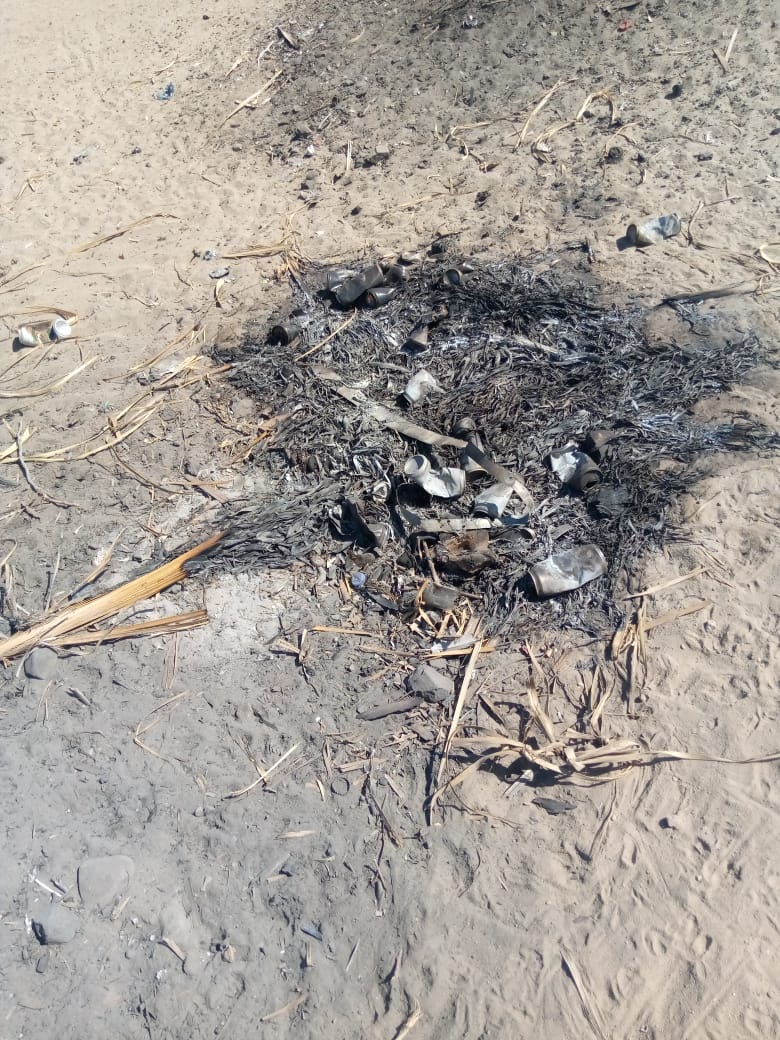 They rarely fall sick. Nobody suffers from indigestion. Nobody says they are bloated. Nobody says they are lactose intolerant. Allergies are largely uncommon. Headaches? What are those? The food is simple and it’s little. It’s uncommon to find someone sleeping in sick. Her mother treats their ailments by boiling specific roots and herbs. They taste bitter, like drinking a goat’s bile. Ibei remembers the one time she fell sick and was taken to a local dispensary 2kms away. There she saw a nurse for the first time in her life. She must have been 8 years old but she remembers her vividly. She had on a white coat and she placed something cold under her shirt, which she used to listen to her chest. She was gentle and wise. People knocked on her door before entering. She had earrings that shone like the stars at night. She had her own mobile phone and she spoke into it in English, like a white person. She wore trousers! Like a man.
And she was beautiful.
That’s what she wants to be. To listen to people’s chests. To give people medicine. To have people knock on her door before entering.
They rarely fall sick. Nobody suffers from indigestion. Nobody says they are bloated. Nobody says they are lactose intolerant. Allergies are largely uncommon. Headaches? What are those? The food is simple and it’s little. It’s uncommon to find someone sleeping in sick. Her mother treats their ailments by boiling specific roots and herbs. They taste bitter, like drinking a goat’s bile. Ibei remembers the one time she fell sick and was taken to a local dispensary 2kms away. There she saw a nurse for the first time in her life. She must have been 8 years old but she remembers her vividly. She had on a white coat and she placed something cold under her shirt, which she used to listen to her chest. She was gentle and wise. People knocked on her door before entering. She had earrings that shone like the stars at night. She had her own mobile phone and she spoke into it in English, like a white person. She wore trousers! Like a man.
And she was beautiful.
That’s what she wants to be. To listen to people’s chests. To give people medicine. To have people knock on her door before entering.
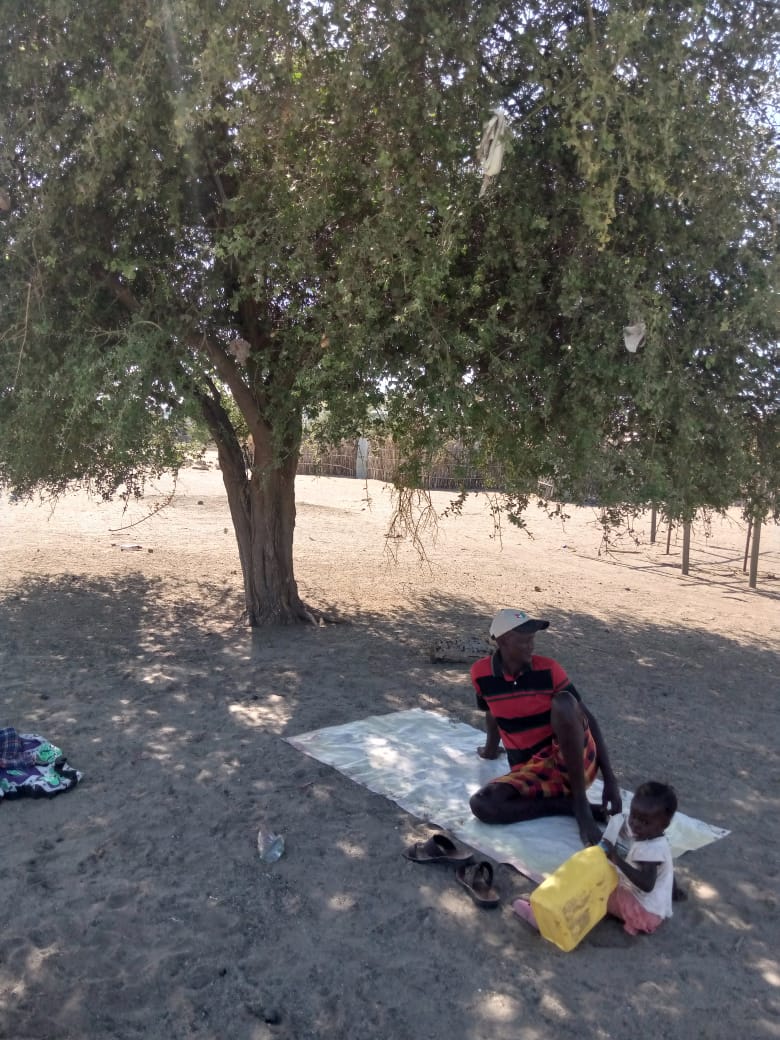 “What do you see Ibei becoming?” I asked. I was on the phone with her father. He’s called Lawrence Emuny. I think his daily word quota is about 34 words. After that, you might as well be talking to a bird. A quiet man, he uses words sparingly. His words feel like ice in the hot sun; it starts melting as soon as it’s out.
“We take them to school and when school closes they take care of the goats,” he said.
“Yes, but what do you want for her when she finishes school one day?”
“Only God knows,” he said.
“Yes, but what about you?” I pressed on in a tattered Swahili. “God wants something for her, but what do you want?”
“I want what God wants,” he said and I laughed…not at God, no, God forbid no, but at that statement. It’s almost like he didn’t want to want something for her lest it contradicts what God wants. Because such things can piss off God.
“Mimi sio malaika,” he said, to mean he wasn’t an angel.
“Kumaanisha?” “Mimi siwezi sema, hiyo ni mambo ya mungu,” he said. “That’s God’s work. He will decide what she becomes.”
“What do you see Ibei becoming?” I asked. I was on the phone with her father. He’s called Lawrence Emuny. I think his daily word quota is about 34 words. After that, you might as well be talking to a bird. A quiet man, he uses words sparingly. His words feel like ice in the hot sun; it starts melting as soon as it’s out.
“We take them to school and when school closes they take care of the goats,” he said.
“Yes, but what do you want for her when she finishes school one day?”
“Only God knows,” he said.
“Yes, but what about you?” I pressed on in a tattered Swahili. “God wants something for her, but what do you want?”
“I want what God wants,” he said and I laughed…not at God, no, God forbid no, but at that statement. It’s almost like he didn’t want to want something for her lest it contradicts what God wants. Because such things can piss off God.
“Mimi sio malaika,” he said, to mean he wasn’t an angel.
“Kumaanisha?” “Mimi siwezi sema, hiyo ni mambo ya mungu,” he said. “That’s God’s work. He will decide what she becomes.”
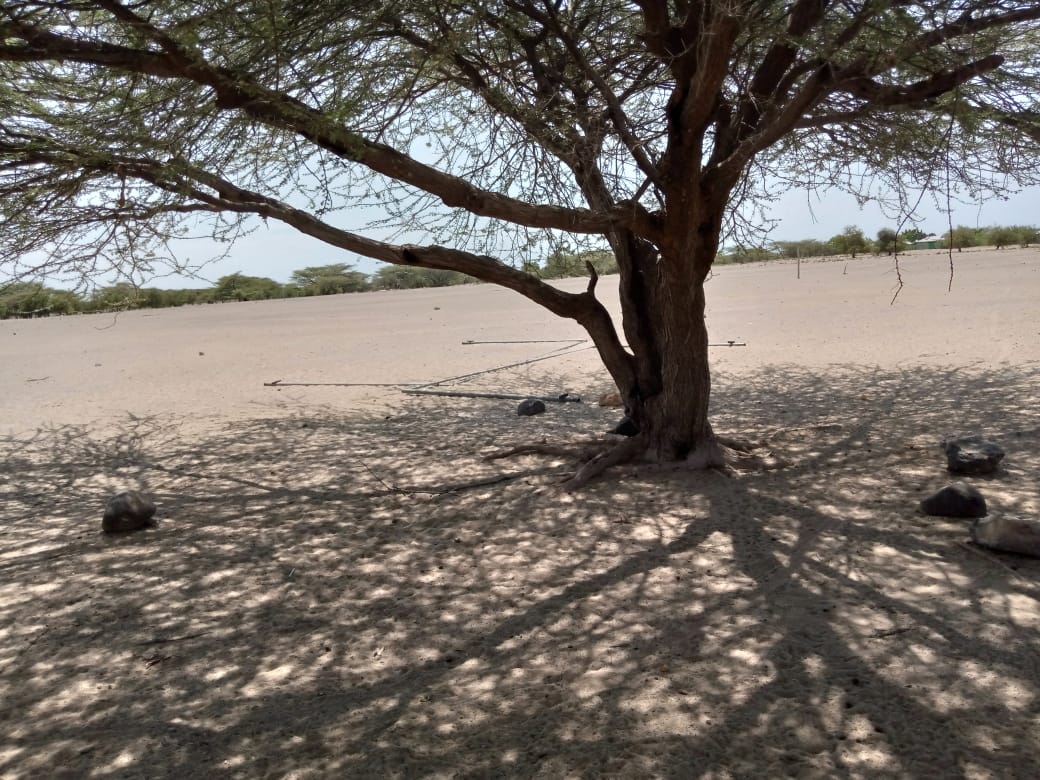 This is Ibei’s school; Kalimapus Primary School. Never heard of it, have you? Nobody votes here. This was Ibei’s Grade One classroom. As you can see, it’s well aerated. You don’t need to knock to enter. The students sit on stones, or on the ground. The teacher props the blackboard against the tree. Even under these circumstances, the teacher dreams for her students. She wants just one to make it. To go out there and be an emissary to the world. But when she stands upfront under this tree, shouting vowels, she can’t afford to succumb to this desperation and the sense of hopelessness, she is the gabion for these young souls. If one day someone cuts this tree, there will be no grade one.
This is Ibei’s school; Kalimapus Primary School. Never heard of it, have you? Nobody votes here. This was Ibei’s Grade One classroom. As you can see, it’s well aerated. You don’t need to knock to enter. The students sit on stones, or on the ground. The teacher props the blackboard against the tree. Even under these circumstances, the teacher dreams for her students. She wants just one to make it. To go out there and be an emissary to the world. But when she stands upfront under this tree, shouting vowels, she can’t afford to succumb to this desperation and the sense of hopelessness, she is the gabion for these young souls. If one day someone cuts this tree, there will be no grade one.
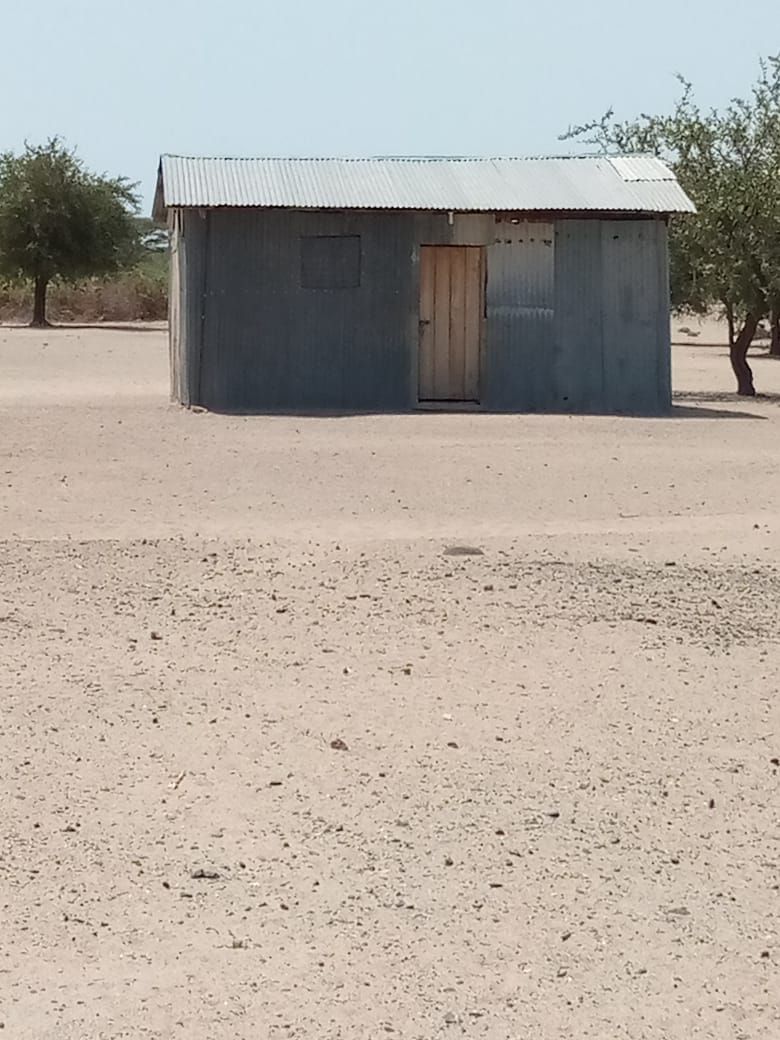 This is the admin block. It’s where the headteacher and the teachers sit. When it’s hot, as it is in Turkana, the roof cackles and crackles and the teachers fan themselves using exercise books. This is the engine from where the school is run and the men and women who sit in there are aware of what faces them daily. When people say, “for better for worse” you immediately think of a wedding, a marriage. But the real marriage here is represented by this structure. This is the face of for better or worse.
This is the admin block. It’s where the headteacher and the teachers sit. When it’s hot, as it is in Turkana, the roof cackles and crackles and the teachers fan themselves using exercise books. This is the engine from where the school is run and the men and women who sit in there are aware of what faces them daily. When people say, “for better for worse” you immediately think of a wedding, a marriage. But the real marriage here is represented by this structure. This is the face of for better or worse.
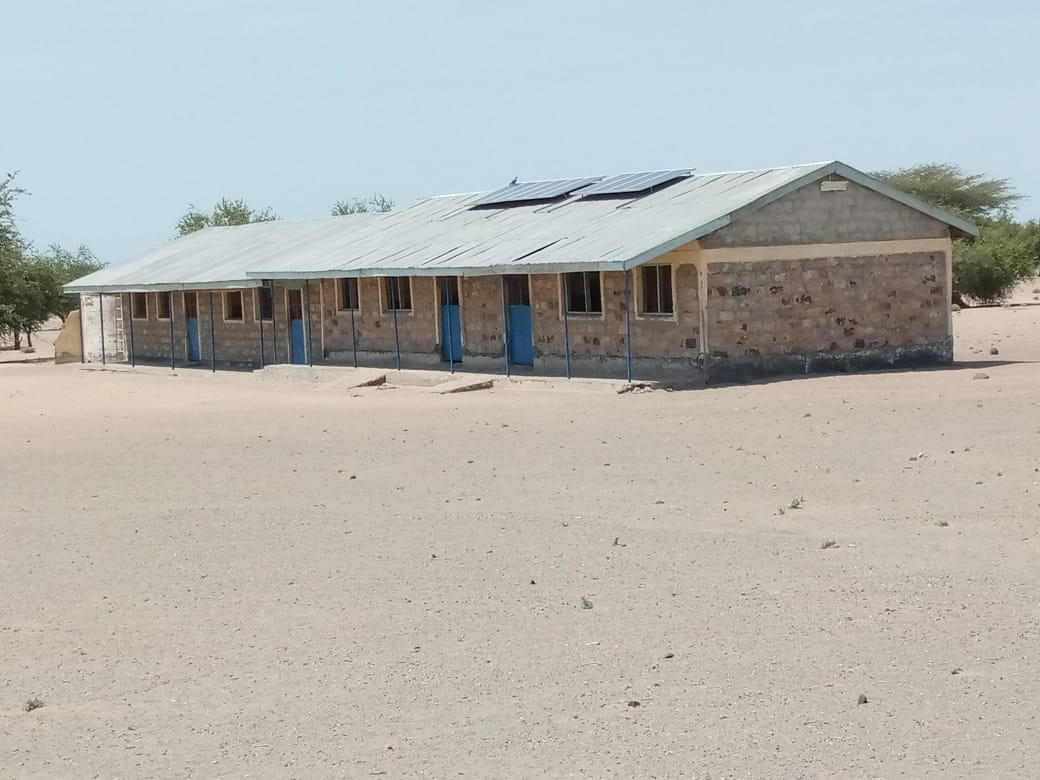 One of those classrooms is Ibei’s classroom. She survived the tree in Grade One. Now she’s in Grade 6. There is a good chance that nobody in those classrooms ever heard of online learning, will never see a computer and will never utter the words, “the WiFi is not working, mom.” Last year their mean score was 208. Of the five girls, only three made it to high school. Most dreams never make it out of those classrooms; they die in the dust. Ibei wakes up and looks at failure in the face – but there are worse things to be staring in the face in Turkana.
One of those classrooms is Ibei’s classroom. She survived the tree in Grade One. Now she’s in Grade 6. There is a good chance that nobody in those classrooms ever heard of online learning, will never see a computer and will never utter the words, “the WiFi is not working, mom.” Last year their mean score was 208. Of the five girls, only three made it to high school. Most dreams never make it out of those classrooms; they die in the dust. Ibei wakes up and looks at failure in the face – but there are worse things to be staring in the face in Turkana.
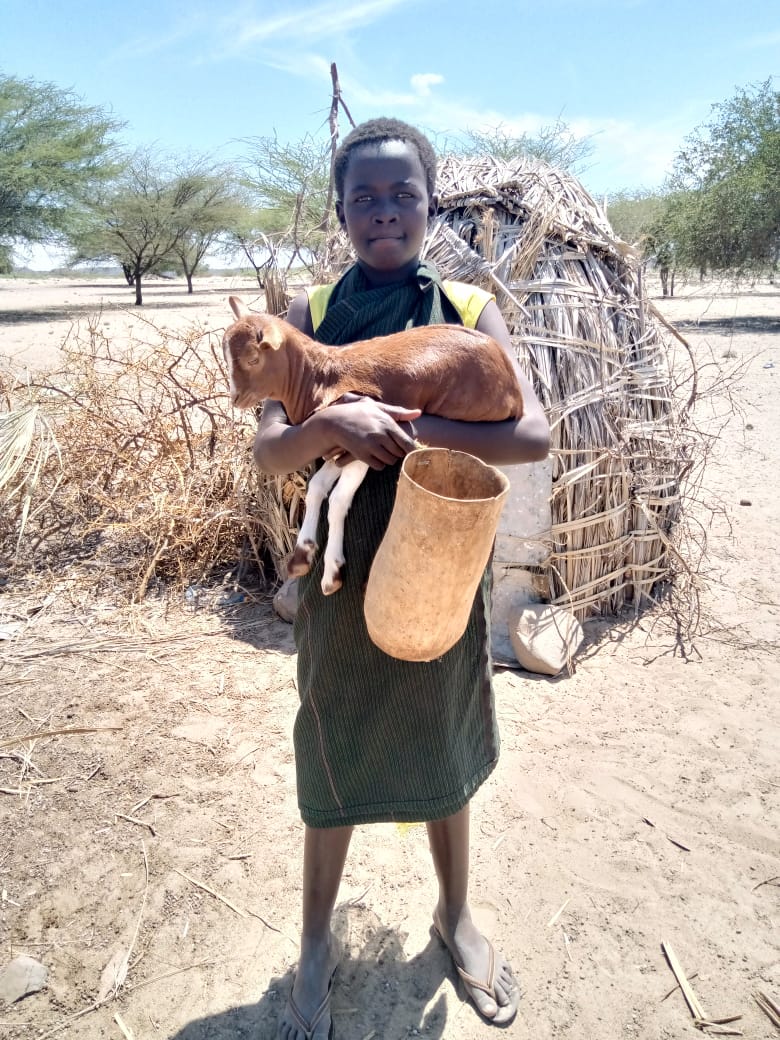 But still, there are little pleasures in Ibei’s life. Like her little goat, Eta-eparas. This – amongst other things like family – is her half full glass.
***
The COVID-19 pandemic has left many school-going children at home. In Kenya, over 15 Million learners were reported to be home in May. While the government has made efforts to ensure that learning is taking place, there are learners who risk being left behind due to factors such as socioeconomic status, geographical area, mother’s level of education, and gender.
PAL Network is conducting a series of Policy Dialogues in Kenya to address such issues through research.
But still, there are little pleasures in Ibei’s life. Like her little goat, Eta-eparas. This – amongst other things like family – is her half full glass.
***
The COVID-19 pandemic has left many school-going children at home. In Kenya, over 15 Million learners were reported to be home in May. While the government has made efforts to ensure that learning is taking place, there are learners who risk being left behind due to factors such as socioeconomic status, geographical area, mother’s level of education, and gender.
PAL Network is conducting a series of Policy Dialogues in Kenya to address such issues through research.
Discover more from Bikozulu
Subscribe to get the latest posts sent to your email.

It’s a good day!
‘She’s afraid to dream too big. To want things that are bigger than her, bigger than her village, or her town.’
Whew. Chills. Chills and perspective.
Dear Bikozulu,
No…No…That there is not a story.
I thought you would ask us the gang to do one thing or the other to make our lovely Ibei go all the way!
I hope there’s a way we can help the girl. I would have pointed out to our politicians but I know better. As Kenyans we stand for each other without the politicians. I don’t have much but when you guys have the till number ready. I will contribute to that girl. I pray we are able to support even two of the students their. And they will light the village bright with their candles.
This is humbling, reminds you to be thankful and offer a helping hand when you can
Ahem
Whoa!
“Most dreams never make it out of those classrooms…”
Makes my heart sink for the number of children who let alone never realise their dreams but also never get to meet anyone that ever achieved anything close to what they dreamt of. Ibei was lucky to have interacted with a doctor so her dream was alive with her. The rest could be another story…Like wanting what God wants for you.
Bottom line, sometimes we take life’s little blessings for granted.
I look forward to the day when Ibei will share this story as a testimony of how far she’s come, and we, the gang, will be there to bear witness. May God fulfil all her dreams.
Ibei looks smart and full of potential. Sir, how can we get her to get to some place – the place , in the words of her father, where God wants her to be?
EXACTLY…How can we?
All the best to Ibei and her Eta-eparas. I hope she makes it to high school.
Ibei is very beautiful. What a humbling story, hope she lives to be a doctor as her heart desires
As a girl who always dreamt of more when she didn’t even know where all the dreams came from, I only wish that somehow she makes it to be everything she wants to be and lives to tell her story.
Working and living in Turkana is one of those things that lives with you forever. And if you are working with NGO’s , you get to be terribly aware of ‘funded problems’ and resources that will never reach Ibei.
I teach up there.Most of those dreams usually die early.Good story
you’ve said what was in my heart though
A very good write up I have been to the lake last year you describe so well good luck
May she overcome her fear to dream beyond the lake and the hills.
Kwaya masta, ulienda wapi? We miss you pale kwaya practice
I Believe i have the will and the heart to help such people/children reach/attain their dreams.
God give me the strength and the resources, may i prosper to one day make God and myself proud that i have helped someone who was in dire need.
Amen.
May her dreams see the light someday..
Stories like this one remind you to be grateful. I was feeling a bit grumpy today morning but after reading this, my gosh! I feel ashamed. What was I even grumpy about? Ibei here doesn’t look grumpy. She’s holding her little goat and is trying to smile despite everything
Thankyou Biko for this.
Hey Ibei, first things first, you have beautiful skin. And you will be a doctor(or whatever else you want to become) because you sound like such a strong little person. We have something in common, I don’t like loud boys either. I like mine quiet. And you have a beautiful name, Ibei. What does it mean?
Ipo siku watabarikiwa zaidi… Ibu will transform that village.
Is there a particular reason why Turkana is so neglected by the government and churches ?
This started in the colonial time. have you ever heard about the North frontier districts?
or sessional paper 1 of 1967?
That`s where the problem started, districts that were not rich agricultural land were neglected by the Gok
And the bigger problem is the few who make it out of there and become what they dreamt or just got lucky.They don’t fight for the rest,they ru away from the though and mention if the word turkana and use others to enrich themselves(their political leaders)
I had a colleague from there who passed on early this year.when taken their for internment,the mother with pain said”apelekwe huko mbali.Tangu apate kazi hajakuja kutuangalia”you could touch the pain In her words.its sad that his two smaller siblings who are around 15 and 13 first saw him on the portrait.
Today is my lucky day. I got to read an artistic representation of the desiderata. And now this. There is something about pictures, how they capture the untamed reality, almost unapologetically.
Ibei’s story is that shared by many of the so called marginalized communities that calls not for our sympathy but rather invokes our empathy to appreciate what we got and aim to make better the lives of those we interact with or are responsible to. Like the nurse, or the teacher, or the efforts put into building better classes like those from grade six.
Sometimes we are too quick to look for something to laugh about in a post. These are our stories. This is life itself, beyond our keyboards and touch-pads.
Wow!
Greatness lies ahead of Ibei. That’s what God wants for her.
This is like living a day at a time. Still, i have hopes for her. Because God never forsakes those who trust in Him.
what can we do to keep Ibei in school?
This wasn’t clear in the story, after being booked how much time do you have before you are owned? What happens if your people refuse the “booking” or ask for more time?
Do the booked girls receive any sex education other than the classical “Avoid boys, they are bad!” sex education most people receive from their parents and church?
Other than wanting what God wants for his children does the introverted father have dreams for them, even when it looks like there is no possibility? Can Abach intervene and cause the father to dream for Ibei, also defer his desire for brideprice until she has graduated?
Ibei, such a beautiful girl! May all your dreams come true!
May we all be greatful for what God has blessed us with n to never take anything for granted.
What a story!
Kenya ni kubwa.
Thanks for the reminder.
Thank you for introducing us to the young Ibei. We would like to help her achieve her dreams, but would her father give up his desire for brideprice to allow her achieve her dreams?
I wish Ibei and other girls in her situation would see more role models. May be she’d want to become a writer, like you Biko.
Three things to mention.
1. It takes courage to carry a dream living in that state of nature
2. No reason can ever justify some of these deplorable situations in this country, devolution inafanya nini uko?
3. My respect for the teacher keeps soaring
Thank you Biko, we need to be reminded that we are fortunate in the lives we live and further that we cannot feel accomplished about ourselves so long as our fellow Africans languish in lives with no dreams or ability to achieve their potential!
I rarely get emotional when reading something but this right here broke me.
Its funny how we “Urban” folks take some things for granted. I hope one day she gets to read this article with a bright smile on her face and mutter silently to herself, “I made it”
Ibei is indeed a beautiful girl.
But the hopelessness of this society. OMG.
There’s really nothing that can be done to help Ibei or these kids’ dreams to be actualized?
The things we take for granted
‘….you may be talking to a bird….’
Biko…. would the father allow Ibei to leave Turkana and perhaps start schooling in Nairobi?!….if so, I have my arms wide open.
Life, sometimes it gives you shade but in the same it will serve you dust.
This here, is a life explained in word.
Biko is there a number we can send something to help get to this place “that God wants”?
Two years ago I met one Maria in Kalemorock, a small center a laga away to reach Lokichar. This was somehow her predicament too. She wanted to be a doctor,or a nurse or just anything in their health system at the village. She dropped out of school in from one. She was in nasokol girls,but lacked the fees. In the process she got pregnant and got disowned by the father. I could not do much but she kept coming at the AP camp where we used to stay and just sit there quietly. They day we were speaking she gave me her aunties number to keep InTouch coz maybe I could get her help in the big town as they know it… Kitale. We lost contact since the line doesn’t work anymore. I guess this is a predicament most of the kids there face and if we the people can do we can for Ibei. So be it. Maybe that’s what God wants for her
These are the stories we should read every day, that this is her life in the year 2020; Yet we complain over frivolities
Cheers to appreciating the little things in life. Such a beautiful and humbling story
i like
Wow..once again am blown away by your writing Biko. Ibei could have been me and somehow I identify myself in her and find that I have this need to do something so that her dreams are not lost in the dirt..all of the Ibei’s dreams..am left feeling abit helpless..maybe there’s something I can do to encourage her / them in my own little way?
Also Biko please get a BikoZulu App , I think it would be a great one!
Biko, thanks for this story! May God uplift Ibei that she might bring impact to her community.
Am slowing down on whining aki
Lets not forget to say thank you to Abach, without whom we would not have this story, walking a kilometer to Ibei’s home so the conversation can take place. Thank you too Biko
This story made me want to wake up and go to Turkana. To Ibei’s dad. To tell him that it’s ok to dream for your child.
I have 2 daughters. I feel close to Ibei. May she conquer the world.
I also write. Pass by my blog, I have sat under Biko in his Masterclass. I hope to make him proud.
https://bloomerscafe.wordpress.com/2020/05/26/1447/
Quite amazing that you highlighted that story so that we see the reality of things so we could not take things for granted my prayers are with Ibei may she achieve her goals and bring light to her community. Big up biko
Wow !!!
What is the clarion call Biko,How can we be of help?
This reminded me that small things make al the difference in the world, like you said, “Ibei’s life. Like her little goat, Eta-eparas”.
wueh! It sad! I feel indebted to make things better for people like her
Ibei seems a strong minded girl yet an introvert, the environment and circumstances surrounding may make her not achieve her full potential.
This has been the life of many living in such rural areas, others even went through FGM.
We see the father calm, calculative maybe even cool to some extent since he believes in God. I would’ve loved to know what the mother thinks of Ibei’s future, what she hopes to become in future maybe she confides more in her mother.
I like her! Whip smart like her father.
As you bestow us our wishes, Lord graciously hear and grant Ibei the desires of her heart.
This is the story of my life in the early 60s.Beat the odds to be a lawyer.Till no will be in order.
Have you ever thought, that perhaps that half full glass we say she has she might think of as full? Or perhaps the glass we envision for her is much bigger than the one she thinks she has but the water is just the same volume.
The concern I have isn’t that dreams are not achieved, it is that the horizon of dreams is limited to what they have been exposed to. There’s a lack of exposure and opportunity. For those of us who can, bring the world to them, and perhaps expand their horizon.
It’s telling that she dares not say what she wants to become when she grows up, knowing that she could just be married off out of the blue
The Admin block with its 2 solar panels gave me some hope that not everyone has abandoned Ibei and her people. The many Aluminum cans burnt amongst the ashes gave me a little sadness thinking its probably Coca cola and/or pepsi is luring the hungry village with their concentrated sugars instead of bringing them clean water and food. Just what is life? I compared Lawrence Emuny, Ibei’s father who spends all day grazing, 30yrs of age with 3 kids, plays with the kids when he gets home until they fall a sleep and they sleep probably on goat skin with the 8month sandwiched between him and his wife until 6:30am. Meet Brayo in Kilimani, woke up at 5am, ate sausages until he cut a sweat but his limbs ached from too much salt and his Diabetes was acting up from the sweet pancakes sweetened with honey or syrup, spent all day breathing smoke from matatus and cars in town and dust combining with the smoke in his lungs. Left work and straight in to a bar (before covid) and continued to drown and destroy his liver with Jameson until 1am before he dangerously drove home to a sad wife who he subconciuosly had sex with but won’t recall the next as he was too drunk; he has kids he hasn’t seen or played with all week as they are fast asleep long before he orders his 3rd from last shot of Jameson at his favorite watering whole. what is a good life?
It reminds me of the things I take for granted. Thank you God.
How I wish that this girl shall finally live her dreams. She has the blessings.
A touching story
Hi, Biko can I adapt her to live with my family?
Reminds me of humility and thanks giving, when you protest you don’t want a certain school, others don’t have the pleasure of choosing.
Let me digress kidogo. There was a safaricom engage series I saw this corona period of some Turkana woman . She kept on talking about when they came back to the country yani these guys are so out there that they believe they are in another country . Back to this young girl i hope she finishes school.
I can live with her. Contact me if the parents can allow.
This just reminded me to be grateful for what I have we’re living in two completely different worlds,,,,, I hope we can do something for this beautiful soul to help her break the glass ceiling and rewrite her story.
Hope Ibei’s dream comes to pass. I had 2 roommates, cousins actually from Turkana in nursing school in Chiromi. I hope she joins their league.
The power of ‘ngakitadea’ is unstoppable. The Gang can hold Ibei’s hand all the way. Come on!
Ibei looks like Lupita. Not in the ‘your dreams are valid’ kinda of way. She bears a resemblance to Lupita.
It reminds me of the dangerous roads to school.These kids will go far.
Some things make me mad, sad and angry. This is Kenya, the year is 2020. And we expect Ibei, our future, to discover Corona vaccines, and some people, who are meant to provide a hope, a future, and a reason for tomorrow are somewhere fighting supremacy battles. Am sure you mention BBI to her she would think it is something she can eat till she is done with fourth form, if her dream is that huge.
Great story as usual. I thank Abach for helping you reach Ibei and for the pictures. He is the hidden hero of the story. Having worked in similar environments I know you chose Ibei as the face of the story but all those boys and girls in that school face similar challenges. They have been recognized through Ibei’s story. There are several aspects of gender, social, economic and cultural factors at play. Turkana county is no longer marginalized, with one of the largest devolved funds and CDF allocations. All Kenyans need to ask more accountability from our leaders and not always think of private fundraisers for what ought to be a right to public services. That way all Ibei’s from Turkana to Taveta will achieve their dreams.
Ibei will get what God wants for her. Thank you Biko for this awakening piece.
The things we take for granted are just business too many.
Such a touching story,am forever grateful for what i have,thanks Biko.Please let us know how we can help Ibei to realise her dream. Such pretty girl
This is a showcase of a true African story. Our problems, courage and inclination to succeed all in one
Gosh
Came in too late but wow!!!! I have to breath in, breath out….. Ibei will one day read this article and smile with that inner voice “I made it”
Let’s appreciate the little things in Life eg Having a touch
Please let no suitors come through that gate
The Turkana sun watches over this and mercilessly burns to over 35 degrees. But perhaps it is to distract them from self pity or to kindle the fire of those with dreams.
The life is humble beyond what I knew to be humble. Unbelievable yet the truth.
Ibei’s life is the life of many others. Its painful to realise that we will move on to another story and eventually we will forget all this.
Its painful to realise that we will move on to another story and eventually we will forget all this…WE WILL NOT. As the gang we will do something …anything to make a difference (speaking for a few gang members)
Come on Biko,
Come up with a program or something to help Ibei and the likes. Her story is very touching.
Great story by the way, good job. But it doesn’t do it justice leaving it at that. Most of us here are willing to make the world a better place for the people whose stories you tell here. Please consider this.
I don’t have much myself but collectively we can crowdfund for this girl’s education. Biko, it is imperative that you follow up on this girl and talk her parents out of marrying her off. Kindly also come up with a till number that can be used for the funding.
THIS IS HER HALF FULL GLASS
So many of us have glasses that are even a 10th full but will never see that blessing since they are constantly complaining
THIS IS HER HALF FULL GLASS
So many of us have glasses that are even a 10th full but will never see that blessing since they are constantly complaining
Brought tears to my eyes. Reminds me of Aro Koriang. I love Turkana, and Isiolo, and Samburu and West Pokot and all of Kenya. Ibei deserves what Nanjekho and Lutukai in other counties are given.
I feel like I have run into Ibei while performing my duties in Loropio- one kilometer from the lake Turkana and one kilometer from her school.
You correctly captured the essence of the area. It is calm and peaceful and we let God’s will prevail.
Am sad…. That we shout equity and equality when we want to be allowed an abortion….or when we want to be allowed to also walk into a club, drink beer, belch and scratch our armpits like men….
Yet, we should be shouting and demanding equity and equitable distribution of resources for Ibei and the other children.
We should be asking the government to put up hospitals, schools and other basic facilities in this forgotten lands….instead, we either shout tangatanga or kieleweke based on our tribal affiliations.
We are the making of a failed society…. A failed economy…..as we shout ‘its our time to eat, yet we are sold back to neocolonialism…. Soon, all of Kenya will be a silhouette… A shadow of its former self.
Why?
Because we refused to harness the all our resources. Ibei is a resource to this nation. Uniquely gifted, well endowed to do her part. But we ignore her and the others like her…..just because they are born in far flung wildernesses.
It will one day come to haunt us….the goose will soon come to roost
Wow!
Quite a story.
Ibei’s Grandma reminds of my own. Illiterate but very passionate about education. Probably because she really wanted it but never got a chance to. Her father swore to never educate girls, lest they become prostitutes. He said he’d never seen a female secretary – I bet they were rare those days.
Awesome read as always
Oh such a beautiful story
Seeing how the dad is afraid to have dreams for his kids is so heartbreaking,I hope Ibei will achieve all of our dreams and please Biko tell us how we can support this girl reach her goals.
A powerful story and Ibei has it all over her face and in her world. You could check with Esimsim somewhere in Napuu Centre if Ibei can be helped and one time become a doctor and treat patients from her own village.
Gratitide is a MUST! thanks for these constant reminders Biko, all the best to the Ibei.
Incredible story. Kudos Biko
Half full glass indeed…
I like this….
This story has touched me deeply! Thanks for such a beautiful piece. How can one get into touch with either the family or Ibei?
This story reminds us all of the little things we take for granted. However, it demonstrates to us how failed we are as citizens.
I see very many commenters asking how they can help financially, whether explicitly or implied. Ibei needs not your money or shelter. She needs you to hold the government accountable because she’s a Kenyan just like you and me. She needs a government that serves her better in Turkana. She needs a better shot in her dream while living with her family and playing with her friends rather than being taken in by a well-wisher in Nairobi or any other town with better schools and amenities. I think this post is a call for us to rise up to be better citizens. That way, all Ibeis whose stories don’t find their way to popular blogs and mainstream media can stand a chance to validate their dreams.
Dream no small dreams.
They have no power to stir the souls of men.
*** Victor Hugo (1802-1885) French writer ***
Biko, we have to do something for this girl and her school mates even if it’s building a classroom for those staying under that tree and sitting on the rock hata kununua desks.
I wonder why people go around building churches for able followers whereas kuna watoto kama hawa wanasoma under a tree and sitting on rocks haki anani.
Perspective……
Maan! This is a reminder to y’all people to always be thankful for what you have. I hope Ibei makes it out and actually be able to listen to people’s chests. Good read Biko!
Why am i chopping onions…
When I read this story, I remember my friend Miriam Modo who made it from Turkana against all odds. She’s one in a million. I salute her. I pray that Ibei and the many other girls like her live to realise their dreams.
Beautiful story. I just love their simple lives. You have a bath on your way home from home, you take a cup of goat milk for breakfast..you get to see a doctor when you are 8years..(by the time our kids two, they have taken a chemistful of antibiotics)
Hi Biko,
How can i send a small token for this girl.
Ibei is beautiful.. She looks intelligent too. I hope something great goes her way soon.
I love the simplicity of life in this article. I just do not know if Ibei knows how blessed she is. With the security, and hope, and the love of family. It seems here nature has learnt to trust one another.
She just doesn’t have the freedom to choose. To choose her future. And every Kenyan citizen deserves that; empowerment to choose. Equality of opportunity.
Ibei, if you ever become a doctor, do not forget the serenity your home offered you. It’s a humble place. But in there you have good health, you have love, you have trust, and you have sincere joy.
Damn that was a nice read.
Deep.
Reading this made me so emotional .How so many times we take what we have for granted and we keep complaining.I hope we can help her go all the way ,find her dreams and make them true .
This is Deep.
The girl is afraid to dream of something bigger than her.
The father is afraid to want something for her, maybe he would contradict God.
Life!
Coming From Turkana and still dreaming of getting out of here,I know what it means.We work extra to fit in the outside world or prove yourself that we arent miginalized.I dream of Nairobi,I dream of abroad,I dream a lot for my little daughter too,I wouldn’t know whats with it with them being Doctors,I pray I would be able to send her to practise medicine in the outside world and bring tangible change to our mother land.
Dreams do come true.Hope one day people will be knocking at Ibei’s door in a hospital for consultation
Sitting here in Texas after attending a peaceful demonstration, this story brings life into perspective. When you think you have a mountain to climb, someone else has a an ocean to swim. I hope we Ibei can have some type of fund we can help. God bless her and her family/village.
Good piece O’er there.When are we getting biko’s app?
Such a great read and definitely given us something to think about.
Mom, the Wi-Fi is not working. That statement yanked at my heart strings. Why do we complain? I’d very much like to be part of that team that helps Ibei realize her dream.
I hope and pray Ibei gets to finish her education to pursue her dreams as shared by her mom. I also hope someone reaches out to the father for empowerment and encourage him of the importance of protecting his children for his kids to enjoy life in all its fullness through education.
The saddest part about this is Turkans happens to be one of the regions in Kenya that received the most donations, grants, marginalized money, government funding and all types of cash flow. Yet this. I hope karma is real and someone pays up dearly someday.
‘Nobody suffers from indigestion. Nobody says they are bloated. Nobody says they are lactose intolerant. Allergies are largely uncommon. Headaches? What are those? ‘…………blessings galore
biko everytime i am about to read one of your stories i get goose bumps because this stories are so real, the mastery of the words and there is a lesson to learn in every one of them. keep up the good work.
I pray one day in future Ibei will bring some hope and dreams to her community, that they will be inspired to dream big
Beautiful story as usual…
https://yambostories.home.blog/2020/05/29/0320-2/
Our political leadership has failed the people of Turkana. Beautiful girl, her dreams are valid.
Beautiful
All I’ve had growing up has blinded me to the fact that Someone somewhere lives without the social amenities that I’ve always underappreciated and that their life goes on despite this lacking. I will forever see things in a different way now.
My heart is hurt and feels heavy …the fact that Ibei, a girl with a dream, a big dream, is already booked for marriage. And soon, maybe as she approaches teenage she will be taken by the suitor for marriage cutting short her dreams. To live a life of regret and visionless life.
I remember volunteering in one of the schools in west Pokot (exact same conditions). The fact that schools are closed means most of those kids don’t have lunch as schools entice them by serving lunch.
I was however inspired by this 8 year old boy after we asked him what he wanted to be when he grew up. He simply said he wanted to be big and strong so that he could help his mum fetch water from the borehole.
Too late to the party, I hope not.
Where is Ibei now?
Can we still trace her? I hope she is not married already. We can sponsor her to learn from a boarding school